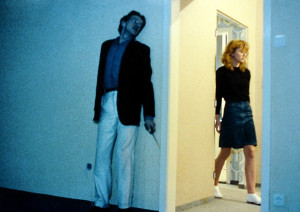 Review: One Night Only
Review: One Night Only
Angst | Gerald Kargl | Austria | 1983 | 83 minutes
Union South Marquee Theater, Monday, October 26, 7:00pm»
Gerard Kargl’s Angst takes us into the mind of a serial killer, and the 32 years since its original release have not diminished its impact. Susan Rathke argues that the film is candid, gritty, and mesmerizing, but not intended to be conventionally entertaining.
“The fear in her eyes and the knife in her chest. That’s my last memory of my mother.”
This chillingly dispassionate opening narration in Gerard Kargl’s Angst immediately puts the viewer on edge, and Kargl never releases us. Based the case of Werner Kniesek, whose 1980 home invasion, sustained torture, and triple murder of an Austrian family made headlines, Angst is as shocking and candid a look into the mind of a true sadist as one is likely to find. Over thirty years after its release in 1983, this startling and mesmerizing take on the serial killer thriller is finally available to American viewers.
The Psychopath, played with frenetic intensity by Erwin Leder, has spent ten years locked up for the attempted murder of his mother. During his incarceration, he endlessly reflects upon his obsession with inciting fear and violence. He knows who he is, and makes no apologies about his true self. Upon his release, his urges consume him without even a second of internal struggle. The following 80 minutes bring us close—way too close—into the life of someone unable to act beyond his next savage impulse and whose sole purpose is to inspire fear in others.
Serial killer narratives often address brutality detached from emotion, but Kargl forces the viewer to intimately connect with each act of violence, each moment of fear. Unlike Henry: Portrait of a Serial Killer and others in the genre, Angst denies us the comfort of watching from outside and observing the actions as alien or impossible to understand. Kargl will not allow us that distance, and instead thrusts us deep into the killer’s every thought via inner monologue. We stay with the killer’s thoughts delivered with a calm coldness that contradicts the intense violent acts that accompany them. Dialogue is rare; the script uses quotes from confessions of other real life serial killers.
Even more disturbing are the moments when the killer relays his abusive life story in real time as he beats and strangles the victims of the present. Rather than providing the audience with a sense of empathy over his troubled past, we are horrified further at the cool blankness with which he shares his sadistic tendencies. The juxtaposition of his confessions of the past with the brutality of his present form a symbolic and obvious bridge, but despite the lack of subtlety it is still potent. He kills practically on autopilot, and only returns his focus on the victims of the present when his “plan” not going as hoped.
We can never get away or get a breather from the killer. Imagine a serial killer bringing a Go-Pro along for his work, keeping it inches from his face, and never turning it off. Kargl’s direction keeps the audience in a claustrophobic grip, intensified by cinematographer Zbigniew Rybczynski’s handheld, high angle close-ups. Leder’s strained, fervid visage fills the screen as we follow him in uncomfortable proximity while he flings himself from one violent act to the next.
This perspective is a direct flip from other home invasion movies, such as Them (2006) or its American counterpart The Strangers (2008), in which the perpetrator(s) have a superhuman sense of orchestration which allows them to be everywhere at once, with a perfectly executed blueprint of terror. With Angst, on the other hand, our point of view is limited to that of the killer who remains a victim to the clumsiness and unpredictable nature of human beings despite declaiming his “perfect plan.” Nothing goes as planned. The result is sloppy, and yet somehow a goal is achieved as the killer claims, “Now, they are all afraid of me.”
Angst is by no means entertaining, nor is it intended to be. The audience is not giggling nervously with the thrill of being jump-scared by a killer at the window, nor are we anxiously awaiting the next new Eli Roth inspired torture/murder technique to be shown on screen. Kargl’s film is grittier, more depressing, and much more terrifying than any slasher thrill-fest. It expertly lays out the horror of the completely random, every day killer, a person with whom a coincidental meeting is enough to mark you as prey.
Note: This screening of Angst is co-presented by the UW Cinematheque and the Wisconsin Union Directorate Film Committee.